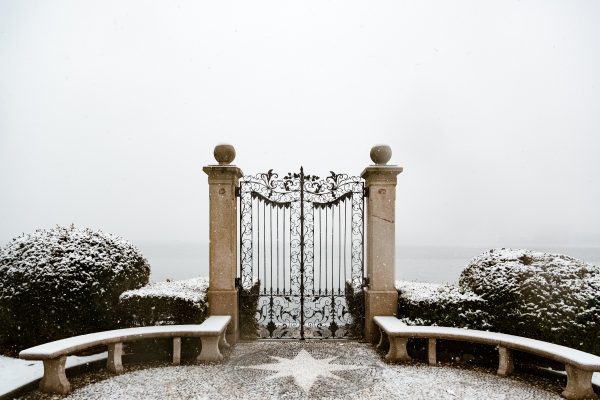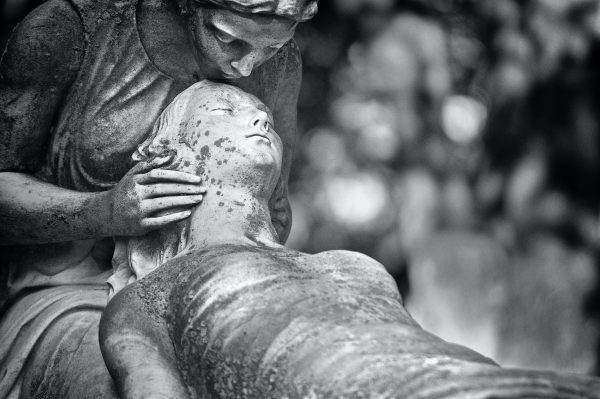The King, the Captain, and the Sea Monster

A Crowning Opportunity in the Midst of Coronavirus
March 29, 2020
Is God using Covid to sift the church?
July 22, 2020A village lay by the sea. Its people were mostly goodhearted folk who lived simple lives of hard work, composed modest poetry and song, and enjoyed deep sleep. Their needs were provided for, they enjoyed salt air and sunshine, and they lived and died in decency.
One or two ne’er-do-wells occasionally disrupted the village and had to appear before the magistrate. A couple of days in the town brig usually corrected the crooked path.
There was one chief threat that the Villagers feared, and that was the dragon that made its home in the dark fathoms of the sea. Some fishermen had seen the dragon for themselves many, many years ago on an expedition. Before they’d seen it, they’d smelled it. An alarming, noxious odor like a concoction of rotted fish and oozing mucous and decayed flesh. They’d glimpsed the long, dark form of an enormous eel, and gasped in horror as rows and rows of scintillating tentacles became visible from its serpentine body, comprised of the tiniest of sillia to thick and frenzied pulsating appendages. One great, yellowish eye with a slitted pupil fixed on the fisherman in ravenous hatred.
Worse than the monster itself, the fishermen witnessed its effects in the torn limbs and bloodied bodies of the victims that slid partially eaten from its gaping, fanged jaws. Victims from another village across the sea.

A King had established the village and appointed Gatekeepers to ensure its security. These Gatekeepers were also the chief correspondents delegated to relay messages from the King and carry out his desires while He was away in a distant country, thus ensuring peaceful and contented living among the Villagers.
It was the Gatekeepers who warned the Villagers of the Sea Monster and how deadly it would prove to get near it. Moreover, while the King had charted out not just the land, but waters of the sea for His citizens to enjoy, He had laid out careful instructions to the Gatekeepers, detailing that if they purposefully broke His laws, they would forfeit their spacious boundaries and allow the Sea Monster to usurp their inheritance.
Knowing the task of the Gatekeepers was highly specialized, the King had prepared a special diet for them. They were to feast regularly on a dish of fruits and legumes and honey. As the Gatekeepers matured in their wisdom, the King designated poultry and beef to maintain their energy and outlook. And of course, they partook of the abundance of the sea.
There was an elite group among the Gatekeepers that trained the newer ones. They were learned and respected Sages, and endured much to care for those under their tutelage. Not infrequently did the Sages sacrifice rest and recreation as the younger Gatekeepers had need of them. Besides these proteges, this group of sages also looked out for the needs of the Villagers around them.
As time went on, the wise and venerated Gatekeepers of the generation that had seen the Sea Monster began to die off. In their place came new teachers. Some were as astute and exacting as their predecessors; others, however, were not. They were careless with their diet and did not bathe regularly, and as such, began to grow anemic.
There rose up also leaders among those who trained the Gatekeepers who assumed the position for very wrong reasons. Some were mercenaries. Some were intoxicated by the idea of the influence they’d wield over the younger Gatekeepers. Still others imagined their motivations were honorable and they wanted to do good deeds, but they’d been corrupted by the instruction of the feeble and dirtied elders over them.
As such, there was quite a lot of variance among the once unified Gatekeepers. A handful of them remained sharp and robust. More and more, the rest had neither the strength nor the wherewithal to manage the tasks the King had assigned them. And because of this, rather than resigning their position or summoning the King for help, or even calling on their fellow Gatekeepers to help with their diet and training, they instead simply took on new tasks – tasks that seemed nice enough, but not the work that the King had asked them to do.
The King had left a blueprint for how the Gatekeepers were to interact with one another and with the other villagers. These blueprints also stated the King’s wishes for running the society so that it was orderly and prosperous.
Long ago, the villagers’ founders drafted a Charter based on the King’s wishes. This formed the basis for all their laws and ordinances. The Charter was designed especially to prevent what had happened in distant villages across the sea – the destruction of entire communities by the Sea Monster, achieved by practices that invited him closer and closer to their shores.
But as time went on, the villagers failed to teach their children the premises of the Charter. The new generation grew entirely ignorant of their own governing principles. The Gatekeepers, who should have been particularly aware of the weight of the Charter’s words, grew as ignorant as the other villagers.
During this time, something unprecedented happened. A group of fishermen boating off the coast caught a creature in their nets. It was a small, eel-like amphibian of muckish-gray color. Putrid in smell and consisting of rows and rows of tentacles, there was speculation among the fishermen that it was the offspring of the great Dragon of the Sea. After a quick counsel amongst themselves, the fishermen thrust a dagger into the heart of the creature and watched in horror as it rose up before them in the boat, seven times in size, spitting and snarling and gnashing its now-visible fangs. It hovered over them as though it would devour them, before writhing and gasping and shrinking into a mass of slime, sliding lifeless over the side of the boat and puddling back into the depths from which it came.
The fishermen rowed home feverishly, eager to tell the others on shore of catching and killing the predator. Most were appalled, hands clasped over their mouths in horror at the details. A handful, however, were angry at the fishermen.
“It was needless to destroy the creature,” they cried. “You should have left it alone!”
The fishermen tried to explain that had they not killed the creature, it surely would have grown in size and become a much greater threat. Their detractors refused to listen.
As a new generation of children grew up in the village, the story of the menacing catch was told less and less. As time went on, any mention of the Sea Monster became scarce.
Instead, the new generation spoke more and more of the lands on the other side of the sea. They were unconcerned with the Gatekeepers’ warnings of how the people there had been ravaged by the Monster due to a lack of knowledge of the King’s ordinances. The children did not share their parents’ fear of the Sea Dragon, and in fact began to envy and idolize those other lands.
“How marvelous it must be to live there,” they’d sigh to one another. “Our little village here is so small. The locals are so unimaginative and dowdy. All they care to do is work and sing and raise children and picnic on the holidays. So simple. So provincial!”
And the children, who had every need met and each desire granted, grew to despise their parents’ generation and its ideals. They disdained their forefathers whose Charter had allowed them to live peacefully and to prosper. And most of all, they hated the King who had brought it all to pass.
“That King is a gruesome fellow,” they speculated as they lounged lazily on the beach, sipping libations of mangoes and starfruit. “An egotistical sort. Ill-tempered and petulant. Thinks too highly of getting His own way.” And so it was, having never asked the Gatekeepers if they might read the King’s correspondences, they superimposed their own natures on the King.
“I’ll bet there isn’t even a King!” one chap cried out suddenly, knocking over his drink. The others stared at him, shocked. Everyone knew the King was real. It was obeying Him that was the issue.
“No, really!” the impish lad maintained, seeing that his outburst had gained him attention. “I think he’s fabricated. Made up! A tall tale!”
In previous generations, the Villagers had diagnosed anyone denying the existence of the King as insane. They would not have entertained such an individual’s participation in matters of the judiciary, so ostensible was such foolishness.
Yet the more this lad went on about it, the more his friends picked up his perspective. Soon, some of them were parroting this idea.
And the more they defamed the King, the more they grew to hate His Gatekeepers.
The Gatekeepers sensed the growing disenchantment permeating the village. The ones who had strengthened themselves on the meat and who bathed regularly and applied the King’s ointment to their eyes were sorrowful to see what had come to pass, but they stood firm in the tenets of the King and of the Charter. They could see precisely the wisdom and congruency of both. But the weaker Gatekeepers – those who’d been negatively influenced by their own instructors and who didn’t have proper sustenance and cleanliness – became preoccupied with what the young folk thought.
Instead of relinquishing their positions as special forces, these weak Gatekeepers decided to reshape the King’s philosophy by parsing his letters, omitting entire sections of some and focusing on a line or two from others. In this way, they ensured not offending the youth.
The meals that had sustained them and which the other Gatekeepers were to eat daily in order to carry out the King’s directives, these weaker gatekeepers began to skip. Moreover, they opted out of the meat entirely and most of the vegetables and legumes. Because it went down so much easier, they fed the others under their care and instruction sweets and dainties and syrups. Thus, these lax Gatekeepers waxed flabby and sluggish and toothless.
Bathing, which kept the skin free from irritations and infirmities, was neglected almost entirely by the lax Gatekeepers. Some in fact argued that regular baths weren’t healthy, and so suspicion was cast on the practice. Along with that, this group stopped purchasing the King’s costly ointment and applying it to their eyes. As such, many a Lax Gatekeeper grew grimy and gave off an unpleasant odor when he entered a room. A thin film of caked dirt developed over the eyes.

“Lookout, ho!” came a Gatekeeper’s call one evening at dusk. He was one of the elders, a respected Sage. “Something sinister on the horizon!”
The others rushed to see where he pointed.
“It can’t be,” another one groaned, shaking his head.
“What is it? What is it?” shrieked the crowd, straining to see what lurked on the horizon.
“Not more than a nautical mile,” the first gatekeeper said grimly. “It’s the shadow of the Sea Monster.”
A gasp went up.
Thin lips pursed grimly. “I never thought I’d live to see the day where he’d get this close to our land.”
“Our own failures have emboldened him,” the second Gatekeeper moaned. “We’ve no one to blame for this breach but ourselves.”
The first Gatekeeper agreed. “We must warn the others,” he said. “We must get the word out to the other Gatekeepers so that they in turn can wake all the Villagers and secure the community.”
“I don’t see any sign of a monster,” scoffed another Gatekeeper, turning his back on the horizon. He crossed his arms over his chest. “I say you’re all paranoid.”
The first Gatekeeper stiffened, then looked deep into the eyes of his brother. “Friend, there’s a film over your corneas. I can see it. Let me apply some of the King’s salve.”
“How dare you diagnose me!” the Lax Gatekeeper snapped. “I can see just as well as you.” And with that he stormed away, tripping over a piece of driftwood as he went.
The Monster was something they’d all heard about, read about as a faraway tale, and suddenly, there it was looming offshore.
To their astonishment, some of the Villagers did not want to hear about the Sea Dragon.
“You’re just trying to scare us,” they accused the Gatekeepers.
“We don’t believe the Sea Monster is as bad as he’s been made out to be,” the youth derided.
“I beseech you, heed the warning,” the staunch old Sage insisted. “The Dragon is far more deadly than we even imagine.”
“Stop ruining our nice lives with all this doomsday talk,” the Villagers reproached, and they stuffed up their ears with their fingers.
Stunned, the lead Gatekeeper and his attendants watched as the Villagers returned to their mundane tasks and to sunning themselves on the beaches and to their endless collecting of seashells, oblivious to what waited to devour them.
Time passed, and the Dragon edged closer to the seashore. Fishermen no longer had the liberty they once had to sail the open sea. They instead lingered close to the coastline, watchful. They did not sing the old ditties nor spin their delightful yarns. Each man was quiet and a bit bent over and careful to mind his own business.
Now the dragon omitted toxins into the sea, and the closer he got to the villagers’ community, the more the toxins affected the fish and plant life they depended upon.
These old seafarers were aware of the Monster’s poisons and told the villagers they must take care lest they ingest something harmful. For a while, the people heeded the counsel of the fishermen.
But after a while, certain ones from among the people started speculating that the Dragon’s emissions weren’t toxic, but rather might have some useful benefits. And in fact, some of them making this claim even partook of the most dangerous of the contaminated fish and plants. Later, when they appeared to be just fine, the rest of the Villagers applauded them. Others followed their lead.
So the old seafarers, like the sages, realized that to warn the others around them about continuing to ingest the toxins would mean inviting the wrath upon themselves. Therefore, they kept to themselves, yearning within for former days, and muting their anxious thoughts with malted rye and hops.

Meanwhile, life in the Village began to unravel.
Increasingly the fishermen were drawing up in their nets the offspring of the monster, many-tentacled and slime-oozing creatures that hid their fangs in the folds of their mouth. But a law had been passed by the villagers that it was now illegal to kill these creatures. In times past, the influence of the Gatekeepers would have prevented such a destructive ordinance; now, the voice of the Lax rose above the Sages and echoed that of the Villagers.
The fishermen spent more and more time mending their nets, torn mercilessly by the offspring of the Dragon. Devoting their time to repairing the damage, they’d less time to prosper their livelihood. Thus less sustenance came to the village.
Rather than a pint or two of ale, increasingly the villagers consumed quarts of it each evening, rendering themselves unfit for recreation and reflection with their families. This meant that children were left largely to fend for themselves. This in turn created heaps of unsupervised idleness, and out of this came a plethora of other problems.
More magistrates were appointed because crime was increasing. Some of the magistrates regarded the Charter, while others took it upon themselves to undermine it.
Neighbors now didn’t socialize as much, and as they stayed apart, they grew leery of one another, quicker to find fault. Spats and property disputes were more frequent, and often escalated.
The atmosphere of the once contented Village was changing.
Even as the Sea Monster flexed his sinister form in the distance, new problems plagued the Gatekeepers. The Lax drifted further from the instructions of the King. Because they did not strengthen themselves on the diet He’d prepared for them, they became more susceptible to the Monster’s toxins in their consumption. And because they fed others under their care the boiled down syrup instead of the full spread of meat, these Gatekeepers in turn lacked the enzyme that would have spared them from the silent but steady poisoning.
More and more, the Lax pared and revised the King’s letters to conform to the culture around them – a culture that was now infused with the Sea Dragon’s presence. The Sages found that they could no longer speak plainly of the truths of the King, for it irritated the Lax and their followers.
In all of this, the Sea Dragon swam ever closer to the shore, and ever more his toxins infused what they ingested.
“Surely you can see him now!” cried one Sage to a Lax, clasping his brother’s arm with one hand and pointing out to sea with his other.
“I see that you’re as rigid as ever,” retorted the Lax haughtily, shaking the Sage’s hand from his arm. “Why can’t you just be nice?”
Indeed, the measure of the culture was no longer what was right and wrong according to the King’s statutes and according to the Charter, but what was “nice” and “not nice,” according to the fashion of the day.

Confusion and chaos spread. Hardly anyone was literate in respect to the Charter anymore, and only a handful of Gatekeepers remained loyal to the full counsel of the King’s letters and took seriously His charges of regular diet and hygiene.
Storms slammed the little village regularly. Rain slashed against shanty windows and violent gales tore at the trawlers.
Young people were dying at an alarming rate. Not only did they lack the proper nutrition to fight off the poisons in their foods, but they were swimming and frolicking in the waters that comprised the Monster’s territory, thus absorbing his toxins directly through their skin and occasionally swallowing doses of the contaminated seawater.
The village had grown in population, and a group known as the Scuttlebutts relayed information from house to house. The Scuttlebutts fed on the sediment and waste that lay at the bottom of the seabed. While most villagers were disgusted by such a diet, the Scuttlebutts fancied it a delicacy.
The Scuttlebutts had an agenda radically different from that of the Gatekeepers and the King; they in fact, were secretly sympathetic to the Sea Monster. In a thousand different ways, they minimized the effects of his toxins on the Villagers. The uptick in disease and deaths were somehow always attributed to other factors, and never to the true source.
And as the Sage Gatekeepers stood their ground and clung to the ancient truths in the face of the changing culture, the Scuttlebutts turned on them more and more, portraying them as out of touch with the rest of the village, rigid and unfeeling – even hateful. The Lax were careful to distance themselves from the Sages.
Most heartbreaking to the Sages was the day that came when certain Villagers began encouraging their children to keep the offspring of the Sea Monster as pets – at the full approval of the Lax.
“When the offspring of the Dragon is full grown, it will devour your children,” the Sages warned.
“You’re part of a dying breed of old-fashioned ideas,” sneered these Villagers. “Time to get with the times.”
“Be nice!” echoed the Lax to their Sage counterparts. “The King was nice to everyone!”

Corpses of young folk could be glimpsed washing in the wake. Women wailed as the body of a son or daughter was discovered, often with telltale fang marks in its flesh. When the Sages pointed out how abandonment of the King’s tenets led to this domestication of the Sea Dragon’s deadly offspring, the Scuttlebutts shrieked at their insensitivity.
“It’s those primal ideals to which you still cling!” they screamed.
“No, they’re right! I should never have left my child to swim so close,” groaned one bereaved mother.
“Shhh, you don’t know what you’re saying!” hissed a Scuttlebutt, sliding an arm around the woman’s shoulders and hurrying her away from the watching crowd. A group of Scuttlebutts closed in around the receding figure of the mother, muffling her words and blocking the onlookers’ vision.
More and more the village resembled the land across the sea on which the Sea Monster had brought his death and oppression. The Sages among the Gatekeepers and the villagers who still held to the Charter and its benefits both sounded a chorus of warning to their counterparts. But the voice of the Scuttlebutts grew louder. They went from house to house and sought to stir even the good folk into an emotional frenzy, exploiting grievances and preying on their illiteracy of the Charter and on the terrible ignorance of their own legacy and history.
“We need a new philosophy, new trends!” the Scuttlebutts cried. And they accused the Sages of being stodgy Sticks-in-the-mud and not understanding the new generation.
As society crumbled around them, the Sages in desperation telegraphed the King in the faraway country. “Help us!” they cried. “The village is in decay, and no one regards Your statutes!”
The Sages knew not how even their King might clean up this mess. But they knew He had the authority to do so. Many of these Gatekeepers knew, ashamedly, that He had granted them this same authority and that they had failed Him in their execution of it.

One day, an old Sea Captain arrived upon a prevailing easterly wind. The Dragon had sought to prevent his arrival, laying snare after snare for him, and had nearly succeeded in capsizing his vessel. However, the King had sent messengers ahead of the Captain and helped navigate his sailing.
Many of the Gatekeepers were put off by him. He was coarse of speech and manner after the fashion old mariners sometimes are, and he did not resemble the ancients who’d help frame the Charter. He certainly did not embody the ideal the Gatekeepers set among themselves. Sometimes crude in his remarks, the Old Captain fit right in with the culture of the village and its icons. But the Scuttlebutts took care that the Villagers did not perceive this.
For it was not for his crass speech nor his unorthodox ways that they hated him. Rather, the Scuttlebutts hated him because he regarded the Charter and because he took issue with the current lawlessness. The crusty old Captain cared about the fate of the village by the sea. He saw the good and the potential it had, and he regarded the kind souls that still dwelt within it. He wished to see it prosper.
The Scuttlebutts and all those who worked for the Sea Dragon, on the other hand, desired to see the Village punished and brought to its knees.
And so they set about the task of getting the Villagers to think like they did.
“The Captain wants to take away your children’s bread!” they shrieked as they sprinted from house to house. “The Captain only likes those who look like him! The Captain will kill off your livelihood if you let him remain in the village!”
Those who’d observed the Scuttlebutts and their ways for years knew better. But those who believed that the Scuttlebutts had their best interests in mind believed their incessant chatter. And as they believed the words of the Scuttlebutts, they in turn grew to hate the Old Sea Captain.
For him they saved up their most bitter venom, and assigned him every vile name they knew. As time went on, they could think and speak of hardly anything else, so much did their hearts brim with hatred.

As time passed, and the Captain and his crew began to call out the Monster for what it was, and indeed launched initiatives that impeded his progress toward the shores of their homeland, many Gatekeepers began to see how the King might use such a crude tool to carry out the dangerous and heavy work that cleaning up the village’s shores required. Still others were too appalled to believe the King would ever ordain such a thing.
The Lax hated the Captain every bit as much as the other villagers did.
“Why do you despise the Captain so?” the other Gatekeepers asked the Lax.
“Because he’s a s*%$head a&%,” they screamed. “And he uses foul language!”
When the Captain began enforcing the statutes of the Charter and prosecuting those who’d broken it, the Scuttlebutts tore their hair and gnashed their teeth.
“Where’s his compassion!” they screamed, hopping up and down. “He and his supporters should be torn to pieces and torched!” And they openly fantasized the grisly details of his demise.
When their defamation didn’t get their desired results, they went off on another tack, calling into question the Captain’s mental health, a tactic long used by the Sea Dragon’s minions on distant shores.
“The Captain doesn’t have both oars in the water,” the Scuttlebutts screeched. “He’s crazed!”
At which the Gatekeepers scoffed, “Your argument’s full of flannel.”
“You revere the Captain like you should only revere the King,” the Lax Gatekeepers accused their counterparts, defending the Scuttlebutt’s accusations.
Since the coming of the Captain, the eyes of the Lax were profoundly altered. A few had actually cleared. But most had gotten so milky and opaque as not to be able to see even basic concepts in the King’s letters.
The Sages, for their part, made plenty of mistakes, as humans are wont to do. In their boldness they sometimes lacked tact. In their zeal they stepped on toes. In their awareness of the Monster’s proximity they often were melancholy. And in their frustration, they waxed impatient.
The Scuttlebutts took note of each misstep made by prominent Gatekeepers and amplified and capitalized on each one in order to destroy their character and annihilate their influence, just as they did with the Captain and the signers of the Charter and even the King himself. And if they couldn’t find a glaring mistake, they simply made one up.
Just as the Lax piecemealed and omitted portions of the King’s letters to suit what was fashionable to the culture, the Scuttlebutts did the same with the Captain’s words.
“Surely you can see what is happening now,” pleaded a Sage to a Lax Gatekeeper.
“I can see that the Captain is not nice,” snapped the indignant Lax. “You should be ashamed of yourself to support such a fellow and to do it in the name of the King!”
The Sage shook his head. “The Old Salt’s style is not how I expected the King to answer our petition. But you must admit that when it comes to carrying out the tenets of our Charter, he’s stemming the tide of lawlessness.”
“To hell with the Charter!” swore the Lax. “The Charter needs reformed so that it is nice to everyone!”
And the Sage in his heart of hearts trembled, for if the Charter no longer stood, the entire Village would surely come under the full oppression of the Sea Monster, just like those people on the distant shore and the tales of terror that had been told. And the Sage knew that his children and their children would have no future.
Thus day after day, the Gatekeepers found themselves in a moral and personal dilemma of unprecedented proportions: keep silent to avoid rocking the boat, or speak of the truth that blazed before their eyes.

Meanwhile, the Captain in his offensive against the Dragon dredged up all kinds of monstrous creatures lurking in the depths. As the stinking, rotted flesh came to the surface, the Scuttlebutts screamed and gestured and shouted to the villagers items of inconsequence, so that the villagers looked another direction and did not perceive what was occurring.
Incredibly, the villagers did not cease to imbibe the bilge slung at them by the scurrying, conniving, Scuttlebutts, despite the Scuttlebutts’ long history of claims that failed to hold water. The villagers, you see, were easily distracted and of an absurdly short memory.
In particular, the groups among the villagers who suffered most under the dominion of the Sea Monster, the Monster’s servants took care to convince that it was the Captain and his breed that had done dirty to them. Those who were direct descendants of the King, and thus of noble birth, the Monster and his minions had convinced that these were not Nobles at all, but the lowest of low.
When through great upheaval within the village the Sea Dragon lost his power to enslave them, he sought to separate them in a thousand other ways by manipulating the mindsets of the villagers and setting their teeth on edge.
When that in turn failed and mindsets changed and a degree of reconciliation took place between the Nobles and the other villagers, the Dragon unleashed the most deadly of his poisons: he began to attack the heads of the Nobles families. Increasingly, the children of the Nobles grew up deprived of a parent. Unsettled, unclaimed, and uninstructed, these children of the Nobles grew up without a clear sense of their identity, and the Dragon feasted on their wounds and hissed through the Scuttlebutts that the Sea Captain was to blame and exploited every raw nerve to bring about more chaos and division.
It came about when the Captain and his crew appeared to be making the most progress of all at cleaning up the seas and pushing back the Dragon that had invaded the territory, the Scuttlebutts felt the frenzied wrath of their wicked master, the Sea Monster, and his panicked desperation. So they gathered in the dark hull of an old pirating craft to scheme a new means to shipwreck the Captain.
“Now we rake the Old Tar from stem to stern,” they cackled in their secret meetings.
And the Scuttlebutts dredged up every grievance and recollection they could find to amplify the anger of the Nobles and to exacerbate and reopen old wounds that may have scabbed over. And they attributed every disenchantment the Nobles felt to the Gatekeepers and to the Ancients and to the Captain, and to a newfound phrase they’d coined: “the village’s inherently corrupt DNA.”
And the Scuttlebutts, who saw the Nobles only as collateral for the advancement of the Sea Dragon, encouraged a remnant of them to riot and loot and burn the Village. It was their “rightful lot” the Scuttlebutts purred, as they gleefully watched the flames from a distance.
To be continued…






